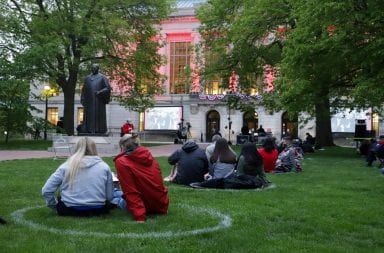Walter Salles’ adaptation of Jack Kerouac’s “On The Road” fails to connect on any meaningful level.
The film version of what had long been considered to be an unfilmable novel had a lot working against it. Kerouac’s 1957 novel became one of the defining pieces of literature of the Beat Generation, and is now considered a classic of modern prose.
However, its sprawling, erratic style never necessarily lent itself to cinematic interpretation.
Francis Ford Coppola, the film’s executive producer , tried in earnest to get an adaptation in front of cameras for decades and failed. Finally, Brazilian director Salles (“Central Station,” “The Motorcycle Diaries”) was hired, and the film went forward.
Perhaps the lesson to be learned here is that if the director of “The Godfather” can’t figure out how to make a movie work, it might be best to just let it go.
The Wexner Center for the Arts held an advance screening of the film Tuesday in its Film/Video Theater .
As far as the story goes, there isn’t much: in late-’40s New York City, Kerouac-surrogate Sal Paradise (Sam Riley) meets the charming Dean Moriarty (Garrett Hedlund) and his young wife, Marylou (Kristen Stewart) , and the trio spends the next few years on road trip adventures that take them across the United States and beyond.
Well-shot, but meandering and too long at 137 minutes, “On The Road” never settles into a comfortable groove. Theoretically attempting to capture the loose, often drug-induced style of Beat writing, Salles seems totally silence-adverse, instead filling almost every second with noise: the bop of jazz, the roar of a car engine, the idle chatter between the actors. Anyone who’s ever spent more than an hour or two in a car knows that the monotony of the road can be exhausting. The film feels like that.
Along the way, the crew encounters characters of varying levels of importance. Kirsten Dunst makes an impression as Camille , Dean’s second wife with whom he has young children.
Unfortunately, short of a nice scene with Sal in a smoky bar, she isn’t given much to do other than act upset with Dean.
Viggo Mortensen shows up as Old Bull Lee , a character written to resemble “Naked Lunch” writer William S. Burroughs. With Amy Adams as his wife, Jane , the pair does good work in one of the few short sequences when the film actually allows itself to stop and catch its breath. It’s all over much too soon, and when the car pulls away from their New Orleans home, I almost wished the camera had stayed there instead of continuing with the three leads.
Hedlund sounds like “Brokeback Mountain”-era Heath Ledger doing a Jack Nicholson impression, and looks like a male model in his role of Dean. Yes, he is charismatic, but it’s mostly because the film (and Sal’s incessant narration) tells us he is, rather than anything he specifically does.
Meanwhile, in his role of Sal, Riley looks like he could be Bill Hader’s little brother, and sounds like the “Saturday Night Live” actor doing his impression of what a Beat writer should sound like.
And Stewart, in the role of Marylou, is once again trying to shed her franchise skin and do “serious” work (which I guess means smoking weed and taking your clothes off). Done up in period-appropriate attire, she’s certainly eye-catching on a busy screen, but often just seems lost.
This is partially the film’s fault for making her character’s object of affection so uninteresting that we never quite believe why she’d put up with what Dean puts her through. But for all her fame, Stewart’s versatility as an actress still seems to have never progressed past a quick shake of the head or dart of the eyes to convey, well, just about everything.
Chalk it up to bad luck that “On The Road” is being released within such close proximity to Paul Thomas Anderson’s “The Master.” The two films are, essentially, concerned with a complicated relationship between two men navigating a post-war America. Anderson’s film, however, is richly layered, and is invested in the psychology of that relationship. Salles (who is no Anderson, and indeed, no Coppola) barely scratches the surface of why Sal and Dean care for each other so deeply, something that if we’re going to be stuck in a car with them for two-plus hours, we might want to know.
Ultimately, much like its lead actress, “On The Road” is often pleasant to look at, but painfully dull. The novel might not have proven unfilmable, but this version would have been better left unfilmed. “On The Road” is scheduled to be released in U.S. theaters Dec. 21 .
Grade: D


